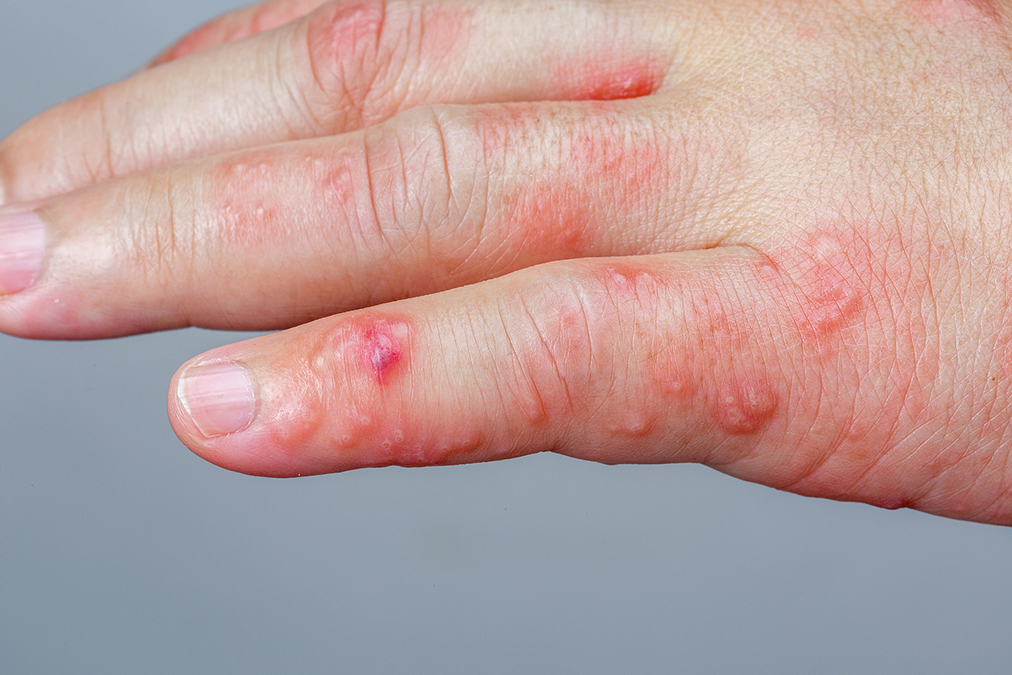 People often think of shingles — also known as herpes zoster — as being no more than an innocent skin rash. But it is actually an instance of acute inflammation of the nerve ganglia that can have lots of complications.
People often think of shingles — also known as herpes zoster — as being no more than an innocent skin rash. But it is actually an instance of acute inflammation of the nerve ganglia that can have lots of complications.
The journal Advances in Therapy has just released a study in which researchers calculate the real suffering caused by shingles and the burden it puts on patients and society.
The Spanish scientists recruited 545 subjects with shingles from four general practitioner networks in Spain. They were all 50 years or older.
The scientists used the Zoster Brief Pain Inventory to quantify their subjects’ pain and pain-related interference in daily activities. They administered this questionnaire on the first day of the skin rash, and again after 15, 30, 60, and 90 days. For the patients who developed postherpetic neuralgia, they used the questionnaire up until day 270.
They used the EuroQoL-5 Dimension questionnaire to assess their subjects’ health-related quality of life.
They also recorded their subjects’ medical expenses from the beginning to the end of their outbreaks.
With all this information at hand, they were able to calculate the cost of shingles for both the patients and for society as a whole.
-
1. Of their 545 subjects, 470 had no herpes zoster complications occurring within 90 days of the appearance of the rash, 50 developed some complications within the first 90 days, and 25 developed postherpetic neuralgia that continued for more than six months.
2. 80.1 percent reported moderate to severe pain and 46.2 percent reported severe pain.
3. 71.7 percent reported poor sleep and 35.3 percent reported severe interference with sleep.
4. Many subjects also reported poor scores for mood, enjoyment of life, and general activity.
5. There were 938 outpatient GP visits, 11 subjects were hospitalized, five visited the emergency room for a total of seven times, three visited nurses for a total of 22 times, and nine had to see an ophthalmologist.
6. 16 patients lost workdays. This totaled 13.1 percent of the employed subjects. On average, they lost 9.9 workdays. Those who cared for them also lost an average of 1.3 workdays each.
7. Overall, each case cost the patient €240 and society €296.
8. Each subject with no complications suffered a €187 loss while society suffered a €242 loss on their behalf.
9. Each subject with postherpetic neuralgia had to pay €571, while society had to pay €712 in each case.
This shows that shingles is in fact a disease that has consequences for individuals and societies with regard to financial costs, lost productivity, pain, loss of sleep, depressed mood, and lower quality of life.

 Overcoming IBD
Overcoming IBD Multiple Sclerosis
Multiple Sclerosis Banishing Bronchitis
Banishing Bronchitis Gum Disease Gone
Gum Disease Gone Overcoming Onychomycosis
Overcoming Onychomycosis Neuropathy No More
Neuropathy No More The Prostate Protocol
The Prostate Protocol Brain Booster
Brain Booster
 Ironbound
Ironbound
 Solution for Shingles
Solution for Shingles
 The Bone Density Solution
The Bone Density Solution
 The Ultimate Healing Protocol
The Ultimate Healing Protocol
 The Parkinson's Protocol
The Parkinson's Protocol
 The Chronic Kidney Disease Solution
The Chronic Kidney Disease Solution
 Overthrowing Anxiety
Overthrowing Anxiety The Fatty Liver Solution
The Fatty Liver Solution The Hypothyroidism Solution
The Hypothyroidism Solution
 The End of Gout
The End of Gout The Blood Pressure Program
The Blood Pressure Program
 The Oxigized Cholesterol Strategy
The Oxigized Cholesterol Strategy
 Stop Snoring And Sleep Apnea Program
Stop Snoring And Sleep Apnea Program
 The Arthritis Strategy
The Arthritis Strategy The Vertigo & Dizziness Program
The Vertigo & Dizziness Program The 3-Step Diabetes Strategy
The 3-Step Diabetes Strategy Hemorrhoids Healing Protocol
Hemorrhoids Healing Protocol The Erectile Dysfunction Master
The Erectile Dysfunction Master Weight Loss Breeze
Weight Loss Breeze The IBS Program
The IBS Program The Insomnia Program
The Insomnia Program The Migraine and Headache Program
The Migraine and Headache Program The Neck Pain Solution
The Neck Pain Solution The Menopause Solution
The Menopause Solution The Ejaculation Master
The Ejaculation Master The TMJ Solution
The TMJ Solution The Acid Reflux Solution
The Acid Reflux Solution The Fibromyalgia Solution
The Fibromyalgia Solution The Psoriasis Strategy
The Psoriasis Strategy